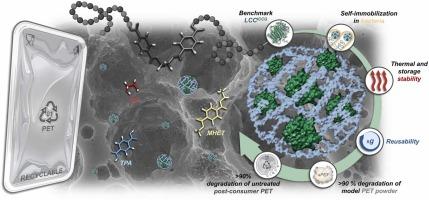当前位置:
X-MOL 学术
›
J. Hazard. Mater.
›
论文详情
Our official English website, www.x-mol.net, welcomes your
feedback! (Note: you will need to create a separate account there.)
Nearly complete depolymerization of untreated post-consumer plastic with an immobilized and reusable PET hydrolase
Journal of Hazardous Materials ( IF 12.2 ) Pub Date : 2025-05-30 , DOI: 10.1016/j.jhazmat.2025.138789
Adrián López-Teijeiro, Natalia Barreiro-Piñeiro, Gemma Eibes, Jose Martínez-Costas
Journal of Hazardous Materials ( IF 12.2 ) Pub Date : 2025-05-30 , DOI: 10.1016/j.jhazmat.2025.138789
Adrián López-Teijeiro, Natalia Barreiro-Piñeiro, Gemma Eibes, Jose Martínez-Costas

|
The accumulation of plastics in the environment has become a serious concern for the entire society. In recent years, enzyme-based biodegradation has emerged as a promising and sustainable strategy for the recycling of polyethylene terephthalate (PET), one of the most widely used polyester plastics. However, the translation of these technologies to the industrial field faces several underexplored challenges, including the immobilization and reusability of the biocatalysts. Here, we present the use of IC-Tagging as a novel one-step methodology for the “in cellulo” self-immobilization of the benchmark PET-degrading enzyme LCCICCG in protein nanospheres. The immobilized enzyme showed to be active against soluble substrates and exhibited improved thermal resistance and long-term storage stability, retaining 58 % of relative activity after 3 months at room temperature. Immobilized LCCICCG also demonstrates remarkable reusability, with minor activity loss up to 10 reuse cycles. Most importantly, nearly complete depolymerization (>90 %) of various untreated amorphous post-consumer PET materials was achieved at a wide range of temperatures (50–70 °C) by removing the products and reusing the enzyme repeatedly. Furthermore, reutilization led to almost full degradation of two consecutive batches of post-consumer PET in 6 days, outperforming all immobilized biocatalysts reported at laboratory scale. Overall, IC-Tagging emerges as a promising and versatile platform for the production, immobilization and reutilization of top-performing PET hydrolases, contributing to sustainable management of plastic waste.
中文翻译:

使用固定化和可重复使用的 PET 水解酶对未经处理的消费后塑料进行几乎完全解聚
塑料在环境中的积累已成为整个社会的严重关注点。近年来,基于酶的生物降解已成为一种有前途且可持续的策略,用于回收聚对苯二甲酸乙二醇酯 (PET),PET 是使用最广泛的聚酯塑料之一。然而,将这些技术转化为工业领域面临着一些未被充分探索的挑战,包括生物催化剂的固定化和可重复使用性。在这里,我们提出了使用 IC 标记作为一种新的一步法,用于在蛋白质纳米球中“在纤维素中”自固定基准 PET 降解酶 LCC ICCG 。固定化酶对可溶性底物具有活性,并表现出更好的耐热性和长期储存稳定性,在室温下 3 个月后仍保持 58% 的相对活性。固定化 LCC ICCG 还表现出卓越的可重用性,在多达 10 次重复使用循环中,活性损失很小。最重要的是,通过去除产品并反复重复使用酶,在很宽的温度范围内 (50–70 °C) 实现了各种未经处理的无定形消费后 PET 材料的几乎完全解聚 (>90 %)。此外,再利用导致连续两批消费后 PET 在 6 天内几乎完全降解,性能优于实验室规模报道的所有固定化生物催化剂。总体而言,IC-Tagging 是一个很有前途的多功能平台,用于生产、固定和再利用高性能 PET 水解酶,有助于塑料废物的可持续管理。
更新日期:2025-06-04
中文翻译:

使用固定化和可重复使用的 PET 水解酶对未经处理的消费后塑料进行几乎完全解聚
塑料在环境中的积累已成为整个社会的严重关注点。近年来,基于酶的生物降解已成为一种有前途且可持续的策略,用于回收聚对苯二甲酸乙二醇酯 (PET),PET 是使用最广泛的聚酯塑料之一。然而,将这些技术转化为工业领域面临着一些未被充分探索的挑战,包括生物催化剂的固定化和可重复使用性。在这里,我们提出了使用 IC 标记作为一种新的一步法,用于在蛋白质纳米球中“在纤维素中”自固定基准 PET 降解酶 LCC ICCG 。固定化酶对可溶性底物具有活性,并表现出更好的耐热性和长期储存稳定性,在室温下 3 个月后仍保持 58% 的相对活性。固定化 LCC ICCG 还表现出卓越的可重用性,在多达 10 次重复使用循环中,活性损失很小。最重要的是,通过去除产品并反复重复使用酶,在很宽的温度范围内 (50–70 °C) 实现了各种未经处理的无定形消费后 PET 材料的几乎完全解聚 (>90 %)。此外,再利用导致连续两批消费后 PET 在 6 天内几乎完全降解,性能优于实验室规模报道的所有固定化生物催化剂。总体而言,IC-Tagging 是一个很有前途的多功能平台,用于生产、固定和再利用高性能 PET 水解酶,有助于塑料废物的可持续管理。


















































 京公网安备 11010802027423号
京公网安备 11010802027423号